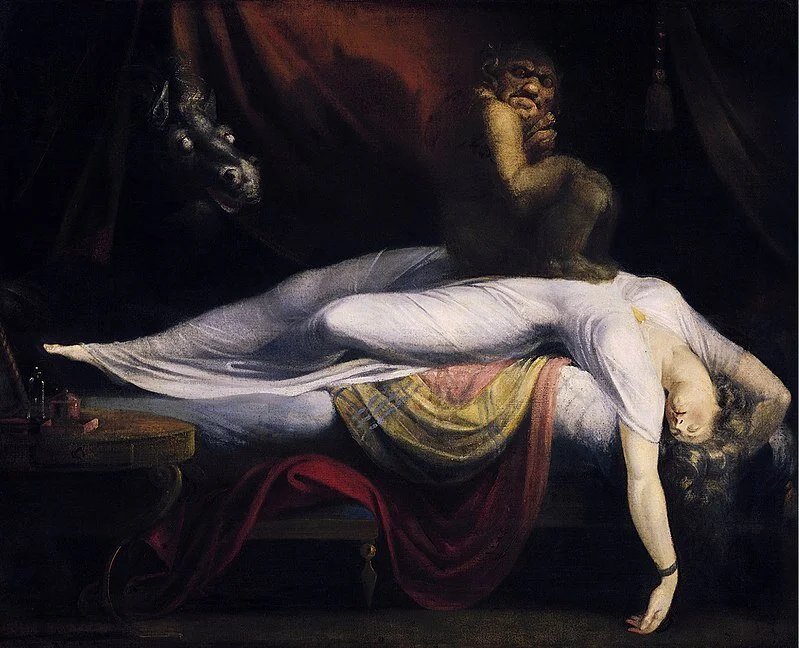A.S. Byatt (2007). Photo credit Seamus Kearney.
A.S. Byatt’s Possession is subtitled A Romance, not A Novel. And “when a writer calls his work a Romance ... he wishes to claim a certain latitude,” writes Nathaniel Hawthorne. While novels aim at “the probable and ordinary course of man’s experience,” a romance, “while it sins unpardonably so far as it may swerve aside from the truth of the human heart, has fairly a right to present that truth under circumstances ... of the writer’s own choosing.” This is Possession’s first epigraph, so the latitude Byatt claims is clear from the outset.
Yet Possession is also, clearly, a Novel: one about two peculiar, skittish academics in the 1980s and the two fiercely intelligent (fictional) Victorian writers they study. In the book's careful tracing of these four characters and their evolving intimacies--in a pleasing parallel, the scholars grow closer as they uncover a courtship between their two authors--in its academic satire and late-Victorian pastiche, Possession is very much about the probable and ordinary.
Randolph Henry Ash, a Tennyson-like fellow, wrote epic poems with titles like Ragnarök and Swammerdam. Christabel LaMotte, a recluse determined to protect her independence through spinsterhood, wrote small, halting, Rossetti-ish poems, and fairy tales. Her great work was The Fairy Melusine, a narrative poem based on a Breton myth of a fae who marries a human man.
In the myth and poem, a knight comes across a beautiful fairy bathing in a forest and proposes to her. Melusine lays one condition--that fairy-tale necessity of a taboo--that he never enter her chamber when she bathes on Saturdays. Of course, the knight breaks his bride's one rule and spies on her in her bath: a half-woman, half-serpent monster. She leaves, she wails, she haunts the castle as a dragon. You know.
And what was she, the Fairy Melusine?
Men say, at night, around the castle-keep
The black air ruffles neath the outstretched vans
Of a long flying worm, whose sinewy tail
And leather pinions beat the parted sky
Scudding with puddered clouds and black as soot,
And ever and again a shuddering cry
Mounts on the wind, a cry of pain and loss,
And whirls in the wind’s screaming and is gone.
Julius Hübner, Die schöne Melusine (1844)
Here is one of the chief features of Byatt’s brilliant balancing act: LaMotte and Ash’s writings, interposed among chapters, exercise that invigorating latitude of Hawthorne's Romance, even as Byatt keeps the narrative otherwise grounded in Novel. Byatt gets to write gorgeous fairy tales of whiteladies on the moors, and win the Booker Prize, too.
For LaMotte, her fairy tales operate much as the Freudian psychologist Bruno Bettelheim proposed in The Uses of Enchantment: they allow her to say dangerous ideas sideways, muffled under thick layers of allegory. LaMotte is Melusine: fiercely private, stubbornly free, ready to fly from Ash rather than submit to confined, Victorian womanhood.
Gurrl, that sh-t is cray.
Men may be martyred
Any where
In desert, cathedral
Or Public Square.
In no Rush of Action
This is our doom
To Drag a Long Life out
In a Dark Room
LaMotte’s other major work explores the Drowned City of Ys, a Breton Gomorrah sunk for its wickedness, its female inhabitants also cursed with transparent skin, revealing “openness to every eye”:
And men can see, as through a glass
Each twisty turn, each crossing pass
Of threaded vein and artery
From heart to throat, from mouth to eye.
This spun-glass skin, like spider-thread
Is silver water, woven with red.
Here too is LaMotte’s theme of privacy; but then, Byatt does something wonderful at the book’s two-thirds mark: after a crashing excerpt from The City of Is--“High howled the wind, the Ocean hurled / His mass of crested jet uncurled”--we find ourselves on the deluged Breton coast, in the howling wind, following a devastated LaMotte as she flees from Ash. Ys becomes more than LaMotte’s metaphor, it bleeds into the setting of the "real," Novel world, itself.
This is awfully romantic stuff, with the potential to get heavy-handed, and Byatt’s ability to keep it all in balance is miraculous. (Did I mention, I like this book a lot?) Helpfully, she deflates the portentousness of Romance with a Novel’s irony, as the academics join the reader in picking apart the psychology of LaMotte’s fairy poems, in their academic idiom:
“the drowned women in the city might represent the totality of the female body as an erogenous zone if the circumambient fluid were seen as an undifferentiated eroticism, and this might be possible to connect to the erotic totality of the woman/dragon stirring the waters of the large marble bath...”
Bettelheim has come full circle, and swallows his own-- er, tail.
Ultimately, though, the fairy theme just makes for effin’ awesome material. Possession is a ranging, even shaggy book, full of digression and allusion, and Byatt, at the end of the day, doesn't deny her book the magic of magic stories. “Just as we all like love tales because there is an instinct of sex,” writes G.K. Chesterton, “we all like astonishing tales because they touch the nerve of that ancient instinct of astonishment.”
Évariste Vital Luminais, La Fuite de Roi Gradlon (1884). King Gradlon of Ys tries to save his daughter Dahut as the waters drown the city.
LaMotte and Ash, our two probable and ordinary academics, and Byatt herself, are chasing that magnificent strangeness that spills from our world, that wild darkness of forests or the riddling path the moon makes on the water, something the Novel alone can’t quite catch.
"And you [write] for the revelation ... of some strange unguessed-at other world, is it not so?" Ash writes to LaMotte, in one of his early, intimate letters. "The City of Is ... the towers in the water not the air, the drowned roses and flying fish and other paradoxical elementals--you see, I come to know you--I shall feel my way into your thought--as a hand into a glove--"

























There is so much out there to read, and until you get your turn in a time loop, you don’t have time to read it all to find the highlights.